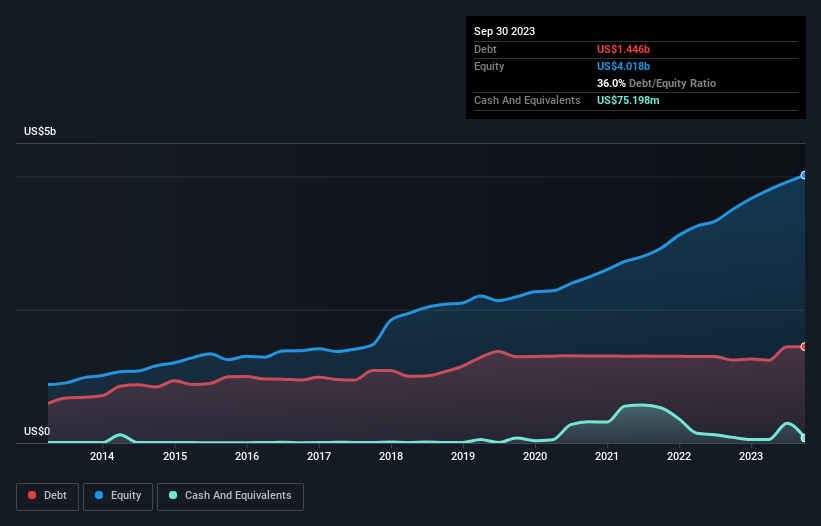- United States
- /
- Transportation
- /
- NasdaqGS:JBHT
J.B. Hunt Transport Services (NASDAQ:JBHT) Has A Somewhat Strained Balance Sheet

David Iben put it well when he said, 'Volatility is not a risk we care about. What we care about is avoiding the permanent loss of capital.' It's only natural to consider a company's balance sheet when you examine how risky it is, since debt is often involved when a business collapses. As with many other companies J.B. Hunt Transport Services, Inc. (NASDAQ:JBHT) makes use of debt. But should shareholders be worried about its use of debt?
What Risk Does Debt Bring?
Generally speaking, debt only becomes a real problem when a company can't easily pay it off, either by raising capital or with its own cash flow. In the worst case scenario, a company can go bankrupt if it cannot pay its creditors. However, a more frequent (but still costly) occurrence is where a company must issue shares at bargain-basement prices, permanently diluting shareholders, just to shore up its balance sheet. Having said that, the most common situation is where a company manages its debt reasonably well - and to its own advantage. The first thing to do when considering how much debt a business uses is to look at its cash and debt together.
See our latest analysis for J.B. Hunt Transport Services
What Is J.B. Hunt Transport Services's Net Debt?
The image below, which you can click on for greater detail, shows that at September 2023 J.B. Hunt Transport Services had debt of US$1.45b, up from US$1.24b in one year. However, because it has a cash reserve of US$75.2m, its net debt is less, at about US$1.37b.

A Look At J.B. Hunt Transport Services' Liabilities
We can see from the most recent balance sheet that J.B. Hunt Transport Services had liabilities of US$1.78b falling due within a year, and liabilities of US$2.58b due beyond that. On the other hand, it had cash of US$75.2m and US$1.37b worth of receivables due within a year. So it has liabilities totalling US$2.91b more than its cash and near-term receivables, combined.
Since publicly traded J.B. Hunt Transport Services shares are worth a very impressive total of US$19.8b, it seems unlikely that this level of liabilities would be a major threat. But there are sufficient liabilities that we would certainly recommend shareholders continue to monitor the balance sheet, going forward.
In order to size up a company's debt relative to its earnings, we calculate its net debt divided by its earnings before interest, tax, depreciation, and amortization (EBITDA) and its earnings before interest and tax (EBIT) divided by its interest expense (its interest cover). Thus we consider debt relative to earnings both with and without depreciation and amortization expenses.
J.B. Hunt Transport Services has a low net debt to EBITDA ratio of only 0.77. And its EBIT easily covers its interest expense, being 20.2 times the size. So you could argue it is no more threatened by its debt than an elephant is by a mouse. In fact J.B. Hunt Transport Services's saving grace is its low debt levels, because its EBIT has tanked 22% in the last twelve months. When a company sees its earnings tank, it can sometimes find its relationships with its lenders turn sour. When analysing debt levels, the balance sheet is the obvious place to start. But it is future earnings, more than anything, that will determine J.B. Hunt Transport Services's ability to maintain a healthy balance sheet going forward. So if you're focused on the future you can check out this free report showing analyst profit forecasts.
Finally, a company can only pay off debt with cold hard cash, not accounting profits. So we always check how much of that EBIT is translated into free cash flow. In the last three years, J.B. Hunt Transport Services created free cash flow amounting to 15% of its EBIT, an uninspiring performance. That limp level of cash conversion undermines its ability to manage and pay down debt.
Our View
Neither J.B. Hunt Transport Services's ability to grow its EBIT nor its conversion of EBIT to free cash flow gave us confidence in its ability to take on more debt. But its interest cover tells a very different story, and suggests some resilience. Looking at all the angles mentioned above, it does seem to us that J.B. Hunt Transport Services is a somewhat risky investment as a result of its debt. That's not necessarily a bad thing, since leverage can boost returns on equity, but it is something to be aware of. There's no doubt that we learn most about debt from the balance sheet. However, not all investment risk resides within the balance sheet - far from it. To that end, you should be aware of the 1 warning sign we've spotted with J.B. Hunt Transport Services .
Of course, if you're the type of investor who prefers buying stocks without the burden of debt, then don't hesitate to discover our exclusive list of net cash growth stocks, today.
New: Manage All Your Stock Portfolios in One Place
We've created the ultimate portfolio companion for stock investors, and it's free.
• Connect an unlimited number of Portfolios and see your total in one currency
• Be alerted to new Warning Signs or Risks via email or mobile
• Track the Fair Value of your stocks
Have feedback on this article? Concerned about the content? Get in touch with us directly. Alternatively, email editorial-team (at) simplywallst.com.
This article by Simply Wall St is general in nature. We provide commentary based on historical data and analyst forecasts only using an unbiased methodology and our articles are not intended to be financial advice. It does not constitute a recommendation to buy or sell any stock, and does not take account of your objectives, or your financial situation. We aim to bring you long-term focused analysis driven by fundamental data. Note that our analysis may not factor in the latest price-sensitive company announcements or qualitative material. Simply Wall St has no position in any stocks mentioned.
About NasdaqGS:JBHT
J.B. Hunt Transport Services
Provides surface transportation, delivery, and logistic services in the United States.
Excellent balance sheet average dividend payer.


